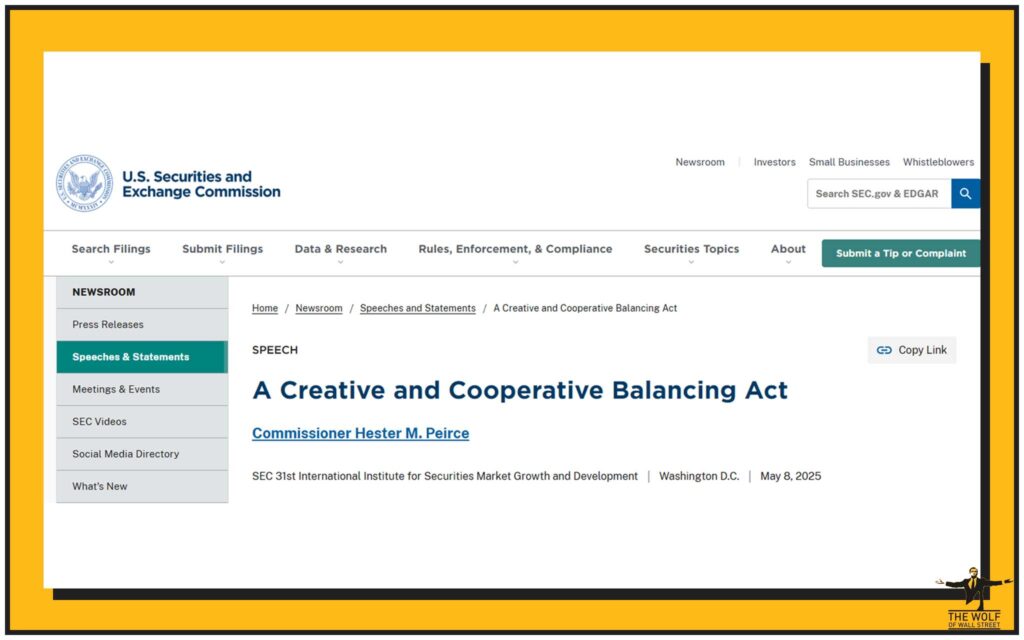Introduction: The SEC’s New Crypto Playbook
The US Securities and Exchange Commission (SEC) is making waves in the crypto market, signalling a potential regulatory pivot that could redefine how blockchain-based securities are issued and traded. With decentralised exchanges (DEXs) and tokenized securities on the rise, the SEC is exploring exemptive orders that could provide much-needed regulatory clarity.
But what does this mean for investors, crypto traders, and blockchain firms? Let’s break it down.

🚀 What’s Driving the SEC’s Policy Shift?
The SEC’s latest move is not occurring in a vacuum. Several factors are pushing the regulatory body to rethink its approach to blockchain-based securities:
- New Leadership, New Priorities:
- Since the appointment of new SEC leadership, there has been a noticeable shift towards refining cryptocurrency regulations. The goal? To balance innovation with investor protection.
- Market Pressure:
- The explosive growth of decentralised finance (DeFi) and digital assets has forced regulators to consider how traditional securities laws apply to blockchain-based assets.
- Political and Economic Influences:
- Political pressure to protect retail investors while fostering financial innovation is also influencing the SEC’s stance.
- Historical Context:
- The SEC has a track record of cracking down on unregistered securities. Recent enforcement actions against major DEXs like Uniswap underscore the agency’s increasing focus on crypto platforms.
For more insights into how these regulatory shifts could impact traders, check out our Trading Insights.
🔥 The Proposed Exemptive Orders: A Game-Changer for DEXs?

So, what exactly are these exemptive orders?
Exemptive orders are regulatory carve-outs that allow specific companies or projects to operate outside of traditional securities registration requirements under certain conditions.
How It Could Work:
- DEXs and blockchain firms could issue tokenized securities without registering as broker-dealers, clearing agencies, or exchanges.
- This would effectively open the door for companies to issue, trade, and settle securities using blockchain technology without the same stringent oversight that traditional securities face.
Winners and Losers:
- Winners: Decentralised exchanges that comply with anti-fraud and anti-manipulation rules could flourish under these new exemptions.
- Losers: Centralised exchanges and traditional brokers may face increased competition from blockchain-based platforms operating under lighter regulatory scrutiny.
💼 What This Means for Blockchain-Based Securities
The SEC’s proposed exemptive orders could significantly streamline the issuance of blockchain-based securities, making it easier for companies to tokenize assets and raise capital.

Potential Benefits:
- Lower Costs: Reducing regulatory hurdles could cut costs for token issuers.
- Increased Liquidity: Blockchain technology enables faster and more efficient trading of tokenized assets.
- Broader Market Access: More retail investors could participate in securities offerings traditionally reserved for institutional players.
However, with great opportunity comes great risk. Blockchain firms will need to navigate a complex regulatory landscape to avoid enforcement actions.
📈 The Rise of Tokenized Securities: Why Now?
Tokenized securities are not new, but they are gaining traction as blockchain technology evolves.
- Increased Investor Demand: Investors are seeking new avenues for portfolio diversification, and tokenized assets offer exposure to traditionally illiquid assets like real estate and private equity.
- Blockchain Efficiency: Blockchain enables real-time settlement, reducing the counterparty risk associated with traditional financial markets.
- Regulatory Uncertainty: Despite the potential benefits, regulatory uncertainty has kept many firms on the sidelines — until now.
For more on the evolving DeFi landscape, explore our DeFi Category.
🛠️ Practical Implications for Crypto Traders and Investors
With the SEC potentially loosening restrictions on blockchain securities, how should traders and investors position themselves?
- Stay Informed: Regulatory changes can impact asset prices. Monitor updates on regulatory frameworks and exemptive orders.
- Diversify Portfolios: Tokenized securities could provide exposure to new asset classes.
- Utilise Expert Analysis: Platforms like The Wolf Of Wall Street offer comprehensive market analysis and trading tools to help investors navigate regulatory uncertainty.
To learn more about the tools and resources available, visit our Newbie Guide.

📈 How DEXs Could Transform Under the New SEC Guidelines
Decentralised exchanges have already disrupted traditional finance by enabling peer-to-peer trading without intermediaries. The SEC’s proposed exemptions could further accelerate this trend.
Potential Benefits for DEXs:
- Lower Compliance Costs: Exemptive orders may relieve DEXs from costly broker-dealer registration.
- Increased Trading Volume: With fewer regulatory hurdles, more assets could be tokenized and traded on DEXs.
- Greater Innovation: New financial products could emerge, attracting more investors to decentralised platforms.
However, DEXs will still need to adhere to anti-fraud and anti-manipulation rules, ensuring market integrity.
🚨 The Compliance Tightrope: Anti-Fraud and Anti-Manipulation Rules
While exemptive orders could reduce registration requirements, they won’t eliminate the need for compliance.
- Transparency and Disclosure: Blockchain firms will still be required to disclose material information to investors.
- Anti-Fraud Measures: Projects must implement measures to prevent market manipulation and fraud.
- Recordkeeping: Maintaining accurate records of tokenized securities transactions will be crucial to avoid regulatory scrutiny.
🌐 How the US Stance Compares to Global Regulatory Trends
The SEC is not alone in reassessing its regulatory framework for digital assets.
- EU: The EU has implemented the Markets in Crypto-Assets Regulation (MiCA), providing comprehensive guidelines for digital assets.
- Singapore: Singapore’s Monetary Authority (MAS) has adopted a more crypto-friendly stance, promoting innovation while enforcing strict AML and KYC protocols.
- UK: The Financial Conduct Authority (FCA) is exploring sandbox initiatives to foster crypto innovation.

For more on global regulatory trends, visit our Policies Category.
💡 Key Takeaways for Crypto Entrepreneurs and Investors
- Stay Updated: The SEC’s proposed exemptive orders could present both opportunities and risks.
- Assess Risks: Companies issuing tokenized securities must comply with anti-fraud and disclosure rules.
- Utilise Expert Guidance: Platforms like The Wolf Of Wall Street provide the tools and insights needed to navigate a rapidly evolving regulatory landscape.
🛡️ Conclusion: The Path Forward in Crypto Regulation
The SEC’s proposed regulatory pivot could herald a new era for blockchain-based securities and decentralised exchanges. By exploring exemptive orders, the SEC is signalling a willingness to adapt to technological innovation without compromising investor protection.

For traders, investors, and blockchain firms, now is the time to stay informed, stay compliant, and stay ahead of the curve.
To get the latest insights, join our active Telegram community: The Wolf Of Wall Street Telegram and unlock your potential in the evolving crypto market with The Wolf Of Wall Street.



